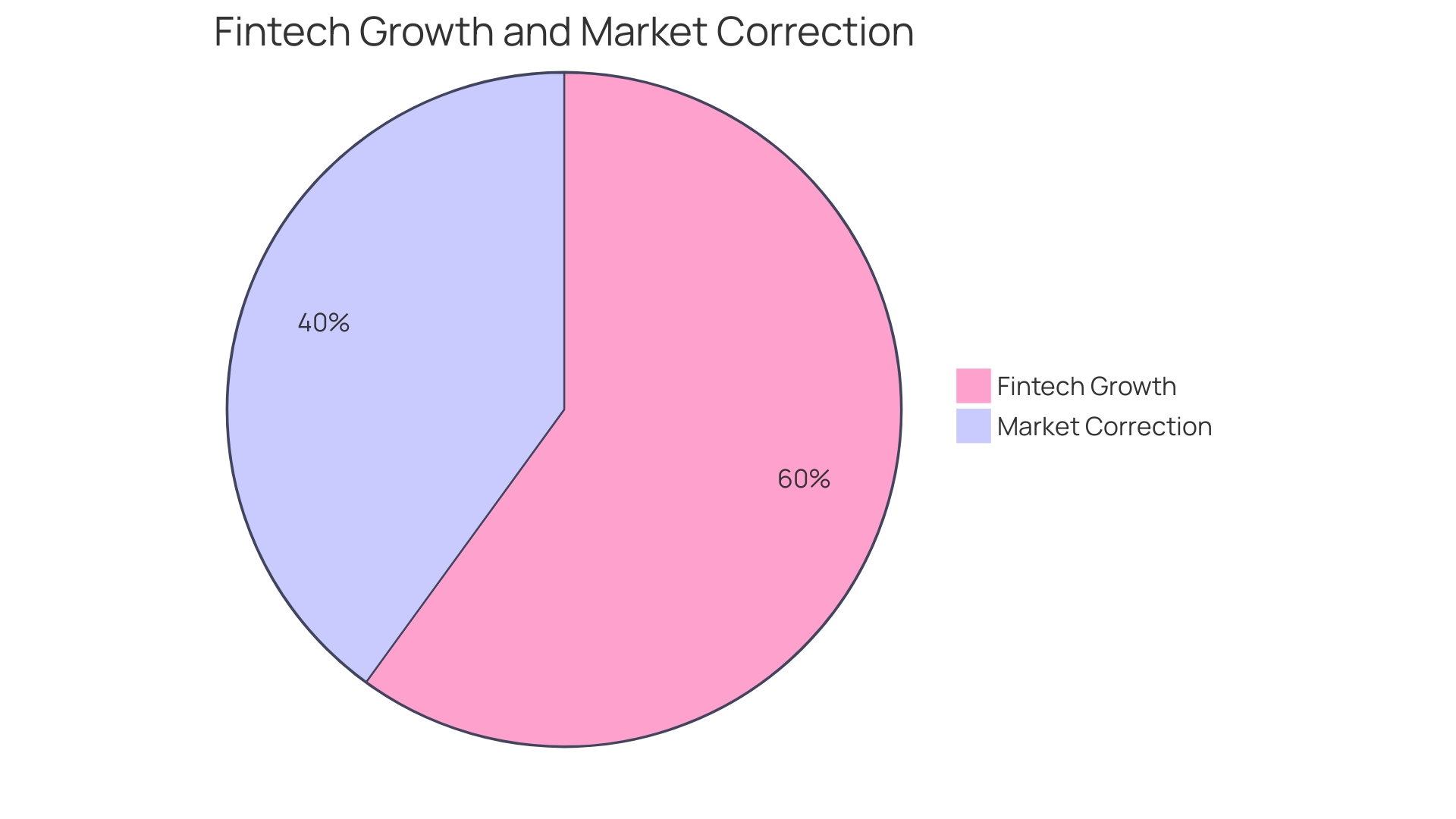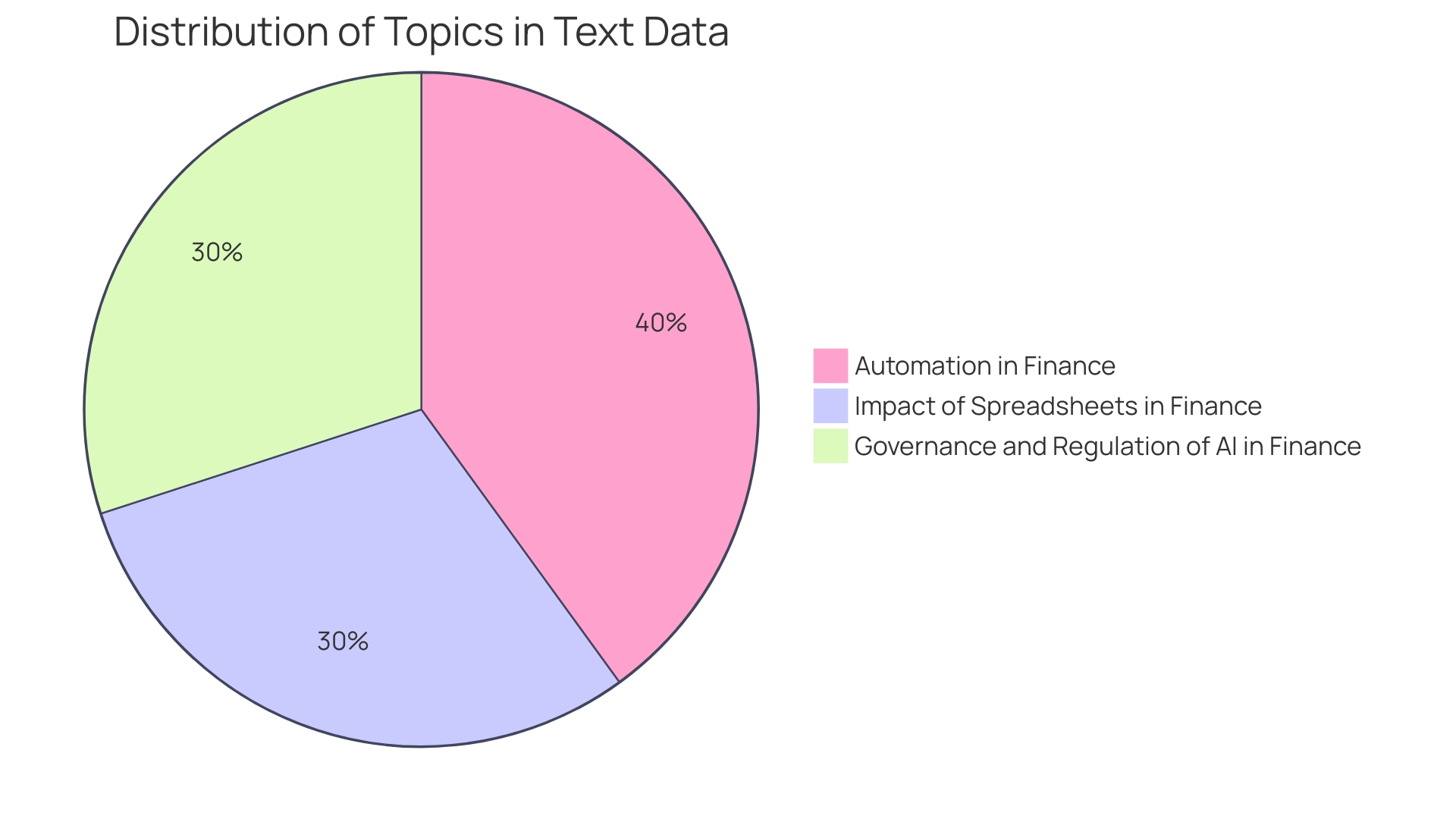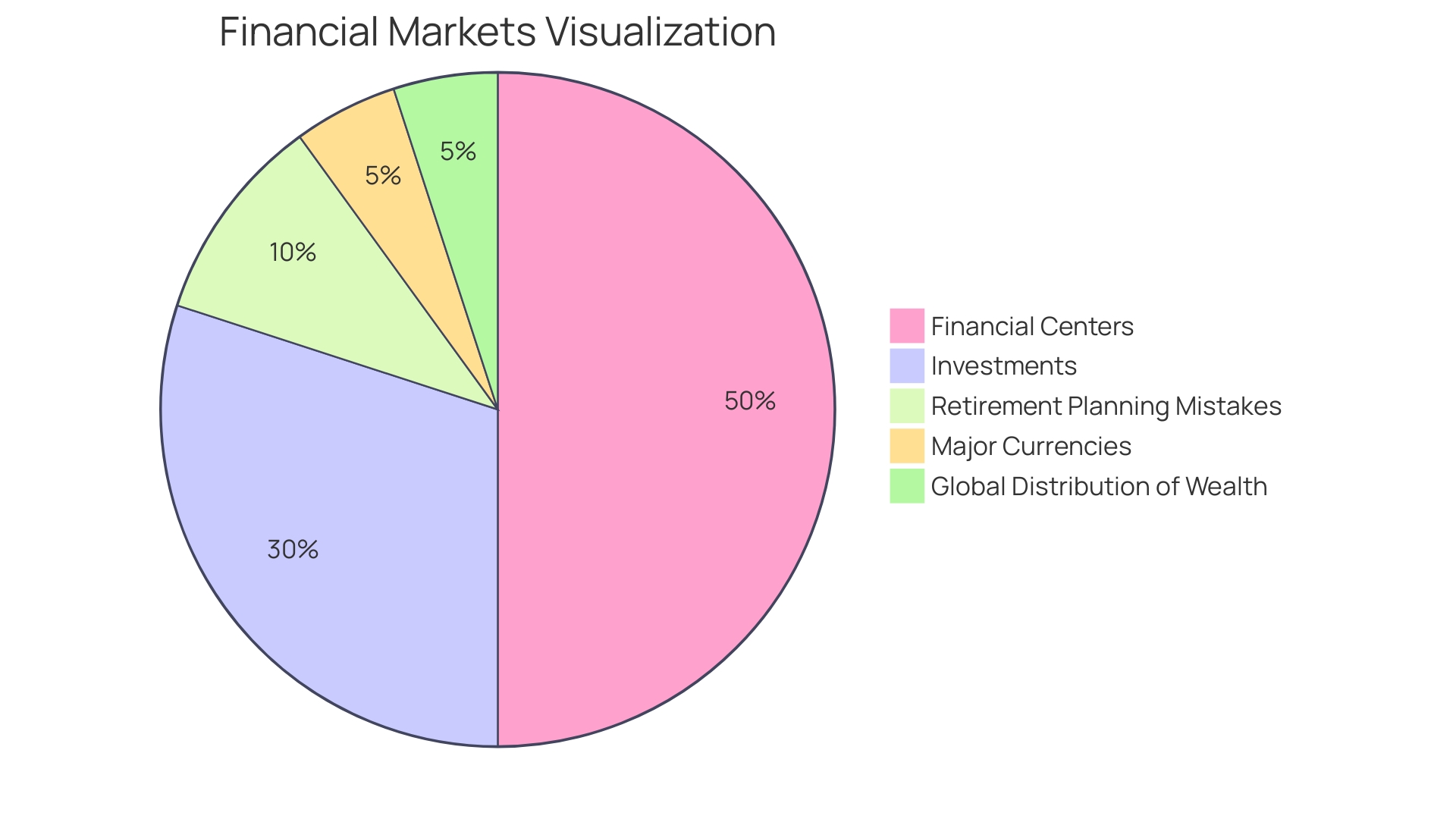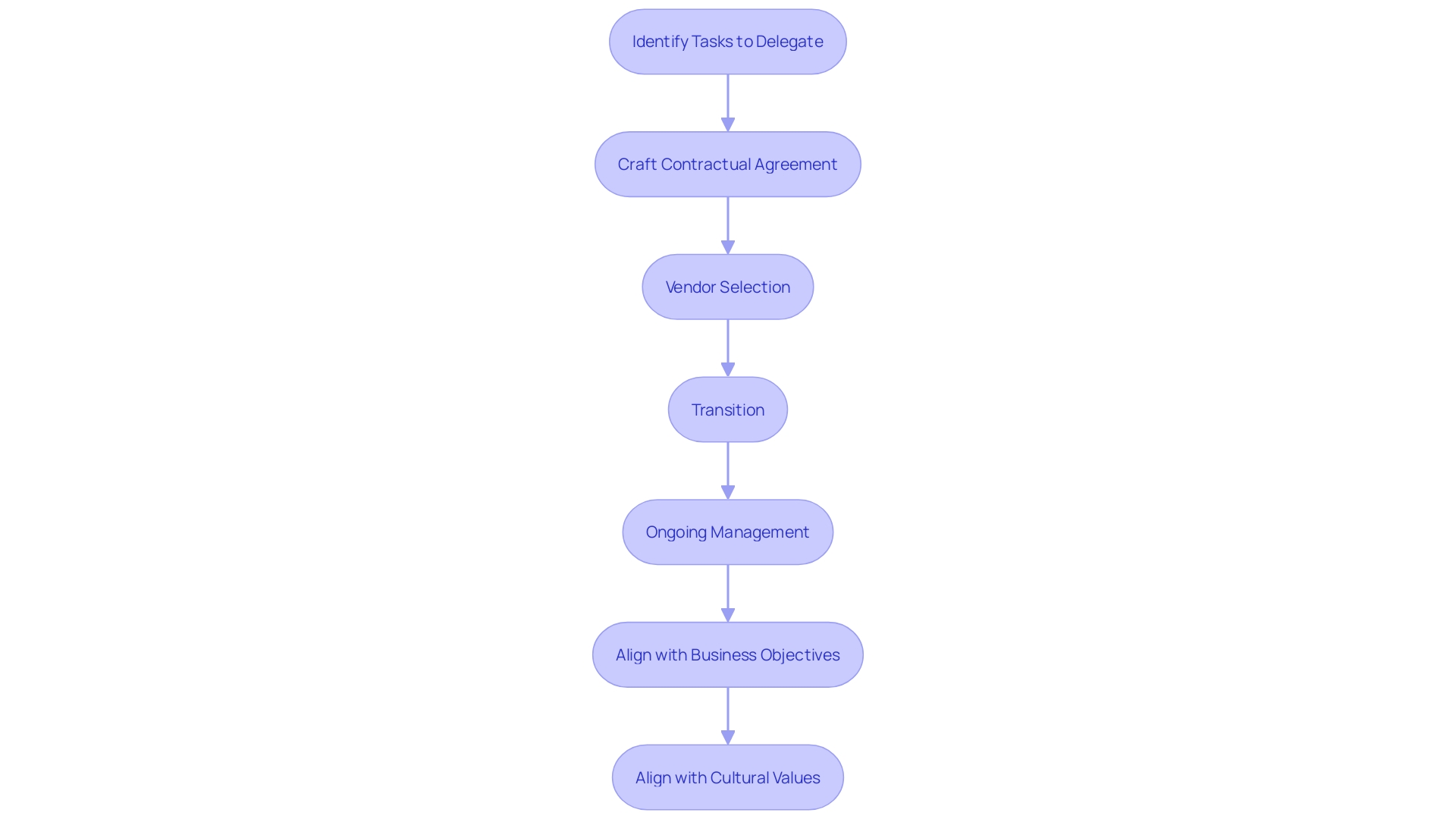Introduction
Outsourcing financial services can be a game changer for companies aiming to refine their operational efficiency and strengthen their fiscal health. The collaboration between TCS and Transamerica serves as a prime example of how strategic outsourcing partnerships can tap into existing knowledge and skills to bolster financial service capabilities. Additionally, the integration of advanced technologies such as AI, blockchain, and cloud computing is revolutionizing compliance tasks in the financial services industry.
The article explores the delicate balance between pioneering financial solutions and upholding ethical standards in the pursuit of a customer-centric, efficient, and inclusive financial future. It also highlights the pivotal role of ISO standards in fostering consistent and secure practices across the financial technology landscape. With the increasing demand for data-driven decision-making and the challenges it presents, outsourcing becomes an apparent solution for organizations to access specialized expertise and navigate regulatory compliance effectively.
The article further delves into the challenges addressed by outsourcing, the implementation process, and the results and outcomes that can be achieved. Ultimately, it emphasizes the need for organizations to adapt and transform their financial departments in response to external pressures and technological advancements to remain competitive and agile in a rapidly evolving market.
Objectives and Goals
Outsourcing financial services can be a game changer for companies aiming to refine their operational efficiency and strengthen their fiscal health. Take, for example, the collaboration between TCS and Transamerica. TCS, already versed in managing Transamerica's IT systems since 2014, took a significant leap in 2019 by assimilating over 2,200 of Transamerica's employees, many of whom had deep expertise with the Vantage software developed by Computer Science Corporation (CSC).
This bold move underscores how companies can tap into existing knowledge and skills to bolster their financial service capabilities through strategic outsourcing partnerships.
Moreover, the integration of advanced technologies such as AI, blockchain, and cloud computing is revolutionizing compliance tasks in financial services. By 2024, these innovations are expected to play a crucial role, primarily due to the escalating complexity and volume of regulatory requirements, especially around personal data and privacy. Such trends emphasize the delicate equilibrium between pioneering financial solutions and upholding ethical standards in the pursuit of a customer-centric, efficient, and inclusive financial future.
Fintech veteran Sergey Kondratenko highlights the pivotal role of ISO (International Organization for Standardization) standards in fostering consistent and secure practices across the financial technology landscape. These standards pave the way for enhanced security measures, risk management, and data protection, contributing to the overall integrity and reliability of financial innovations.
In the context of Banking as a Service (BaaS), akin to the well-known SaaS model, companies are increasingly adopting subscription-based solutions from service providers, thereby bypassing the arduous process of obtaining banking licenses. This model presents two main approaches: a direct partnership with banks via APIs or a collaboration with third-party BaaS providers. The latter can be either on a subscription basis or per service, with the possibility of white-label or co-branded alliances.
This strategic shift is exemplified by @Cetelem Spain's recent transformation into a bank, leveraging the BaaS model to enhance its digital banking offerings.
The confluence of outsourcing, regulatory technology, and standardized security practices demonstrates a dynamic evolution in financial services, aiming to achieve not only operational excellence but also to navigate the complexities of compliance and data protection in the digital age.

Target Audience
In an insightful case study, Nets, a digital payment solutions company with over five decades of history, showcases the strategic shift in presenting technical financial data. The Copenhagen-based organization, which caters to the needs of clients within the financial and banking sectors across Europe, embraced a novel approach to data visualization. Instructional Designer Karmela Peček of eWyse Agency reflects on the challenge: transforming complex tables and schemes into engaging formats that encourage self-guided user discovery.
This initiative exemplifies how financial departments can innovate beyond traditional methods, a concept resonating with the evolving role of CFOs.
According to Razzak Jallow, CFO of FloQast, CFOs are expanding their influence, leveraging technologies like automation to transcend traditional financial functions and foster strategic, operational contributions. With an estimated 80% of financial operations ripe for automation, as noted by Shagun, CEO of System, there's significant potential to reallocate employee efforts towards strategic initiatives, enhancing customer satisfaction. These perspectives underscore a need for financial leaders to adapt and transform their departments in response to external pressures and technological advancements.
Furthermore, the demand for data-driven decision-making is surging, with a 2022 S&P Global survey revealing that 69% of respondents rely heavily on data for their decisions. Yet, this push for analytics faces challenges, including data security risks and a shortage of skilled professionals, with a 2022 deficit of up to 200,000 data science experts. As financial sectors grapple with regulatory compliance and the complexities of modern analytics tools, the case for outsourcing becomes apparent.
Outsourcing not only offers access to specialized expertise but also provides a strategic avenue to navigate these hurdles effectively.

Challenges Addressed by Outsourcing
Outsourcing financial services has become an increasingly common strategy for organizations to enhance their operational efficiency and compliance, particularly in complex areas such as payroll management. By engaging third-party expertise, companies can streamline their financial operations with standardized processes and automated systems. This not only reduces the risk of errors but also ensures adherence to diverse tax laws and regulations across different jurisdictions.
The benefits extend beyond compliance, with tangible time and cost savings. Companies that outsource payroll, for example, can eliminate the need for specialized full-time roles, thus reducing overhead costs.
The effectiveness of outsourcing is evident in various cases where organizations have seen significant improvements in their operations. For instance, the Ford Foundation enhanced its content management and digital engagement by updating systems to meet the demands of increased content production. TBC Bank's agile transformation, aimed at reducing organizational complexity, saw the adoption of modern working practices and structures that streamlined operations.
Similarly, TotalEnergies Digital Factory developed tailored digital solutions to support the company's transition strategy and digital transformation, highlighting the role of outsourcing in modernizing legacy systems.
In light of the European Central Bank's recent emphasis on improving banks' management of outsourcing risks, particularly in data processing, it's clear that outsourcing is not without its challenges. The increasing number of outsourcing contracts and the growing budget allocated for these strategies underscore the need for rigorous oversight and risk management.
Outsourcing is not just a cost-cutting measure; it's a strategic decision that can lead to improved focus on core competencies and strategic activities. This is particularly true for small businesses, which often outsource to gain access to expertise and resources that are otherwise unavailable in-house. As a result, outsourcing enables businesses to remain competitive and agile in a rapidly evolving market.

Case Study Overview
A compelling illustration of successful financial service outsourcing is reflected in the partnership between Transamerica and TCS, which dates back to 2014. TCS, an Indian software giant, initially provided IT system maintenance for Transamerica, gaining familiarity with their Vantage software. This relationship evolved significantly in 2019 when TCS absorbed nearly 2,200 Transamerica employees, experienced with Vantage, amidst intriguing discoveries by a CSC employee at one of Transamerica's facilities.
The Computer Science Corporation (CSC), specializing in software services for insurance firms, created the Vantage software, a mainstay in the insurance sector. The unfolding scenario in 2019 marked a pivotal juncture for both companies, highlighting the complexities and potential of strategic outsourcing in financial operations.
TCS's foray into Transamerica's operational fold exemplifies the trend of technology not only automating but also reshaping financial services. Automation is streamlining financial tasks, from investment portfolio rebalancing to expense management, enhancing efficiency, and curtailing human error—a vital consideration amid rampant cyber threats. Moreover, as the financial industry races towards a tech-driven future, the paramountcy of customer-centricity remains, with human interaction still deemed irreplaceable for resolving customer issues and rendering advice.
This case underscores the broader narrative of the UK's status as a financial powerhouse, renowned for its extensive financial services, from capital markets to insurance. The UK's financial sector is distinguished not only by its capacity for international bond issuance and trading but also as a hub for foreign exchange and asset management. Such prowess is underpinned by a robust regulatory framework, inviting global investment professionals.
Furthermore, the industry is urged to adopt a proactive approach to AI, balancing innovation with the management of systemic risks and ethical considerations. This includes fostering collaboration between regulators, AI developers, and ensuring international regulatory coordination. The integration of AI in finance is poised to drive competition and innovation while necessitating vigilant governance to harness its full potential responsibly.
In light of these dynamics, the case of TCS and Transamerica underscores a broader trend of financial service outsourcing and the integral role of technology in modernizing and securing financial processes, all while emphasizing the undiminished value of human interaction in customer service.
Outsourcing Process and Implementation
To successfully outsource, companies must navigate a series of strategic steps, beginning with the identification of the right tasks or operations to delegate. The journey includes crafting a solid contractual agreement that outlines the scope, responsibilities, and payment terms. This agreement is vital for setting clear expectations and delivering successful outcomes for both parties.
For instance, Guthrie Clinic's dedication to community health is echoed in their choice of IT solutions that support their holistic healthcare approach. Similarly, Rivian's commitment to net-zero emissions by 2040 drives them to seek outsourcing partners who can aid in creating sustainable processes that align with their environmental goals.
Recent news highlights the collaborative efforts between Cognizant and Alm. Brand Group, focusing on enhancing efficiency through the automation of manual and repetitive tasks. This partnership showcases how outsourcing can evolve to address competitive needs and improve customer experiences.
Outsourcing isn't just about cutting costs; it's about tapping into specialized expertise that can propel a business forward. For example, small businesses often turn to outsourcing for content creation, bookkeeping, and hiring, allowing them to concentrate on their core competencies. With only 16% to 30% of technology projects meeting their intended goals, outsourcing to seasoned consultants with relevant expertise can significantly increase the chances of project success.
In the end, each step of the outsourcing process, from vendor selection through transition and ongoing management, should be approached with a strategic and informed mindset, ensuring alignment with the company's broader business objectives and cultural values.

Results and Outcomes
Outsourcing financial services can be like navigating through a maze – complex and filled with potential surprises at every turn. However, when done right, the rewards at the end can be substantial. Take the case of TCS and Transamerica, which paints a vivid picture of the transformative power of outsourcing.
Since 2014, TCS had been maintaining Transamerica's IT systems, eventually absorbing over 2200 of their employees. This strategic move led to a deeper understanding and operation of Transamerica's systems, showcasing the critical importance of knowledge transfer in outsourcing relationships.
Similarly, Finalto's expansion with new data centers in Singapore and New York is a testament to the far-reaching implications of such initiatives. Their strategic development not only solidifies their global presence but also represents their commitment to growth and innovation in the financial services sector. This aligns with the broader industry trend where fintechs continue to thrive, supported by the sweeping transformation of banking and booming e-commerce, especially in emerging markets.
Amidst this backdrop, YNAB's approach to financial management stands out. Their zero-based budgeting system, which encourages consumers to assign every dollar a job, exemplifies the tailored solutions made possible by financial service providers. It's an approach that resonates well with users, leading to a more intentional spending and saving pattern.
However, challenges are an inevitable part of the journey. The transition to digital is fraught with the need to avoid service disruptions that can erode customer trust. FYNDNA's experience demonstrates the delicate act of balancing innovation with reliability in the financial sector.
Adopting cloud-native technologies and digitizing banking services is critical, and when executed effectively, can significantly enhance customer engagement and profitability.
In conclusion, outsourcing in the financial realm is not a one-size-fits-all solution. As the industry evolves, so must the strategies employed by organizations. From embracing new technologies to streamlining operations, the path to success is multifaceted and requires a clear vision, robust infrastructure, and an unwavering dedication to innovation.
As the financial landscape continues to shift, those who can adeptly navigate these changes will emerge as leaders, ready to capitalize on the opportunities that lie ahead.
Appendix: Additional Resources and References
Delving deeper into the realm of financial services outsourcing requires a solid foundation of resources and case studies to guide strategic decision-making. For instance, the transformational partnership between TCS and Transamerica is a testament to the complexities and potential of such engagements. TCS, since 2014, had been integral in maintaining Transamerica's IT systems and, in a pivotal move in 2019, integrated 2,200 Transamerica employees, gaining valuable insights into CSC's Vantage solution.
This case study not only highlights the intricate process of IT and service outsourcing but also the strategic human resource allocation involved in such endeavors.
Furthermore, the evolving nature of financial services is reflected in the emergence of Banking as a Service (BaaS), a model where companies leverage banking services without the need for a banking license, through a subscription or partnership. Understanding BaaS is crucial, as it signifies a shift towards more agile, tech-driven financial offerings, a trend supported by the growing emphasis on data-driven decision-making within the financial sector. A report by S&P Global in 2022 revealed that 69% of organizations largely rely on data analytics for their decision-making processes, underscoring the importance of financial analytics tools for informed, evidence-based strategies.
However, the push for data-driven decisions comes with its challenges, such as the need for heightened data security and a growing demand for skilled professionals. The financial analytics market has felt the impact of these challenges, with a reported shortage of up to 200,000 data science professionals in 2022 and heightened risks associated with cloud-based data storage. These factors are critical considerations for any organization looking to navigate the complex landscape of financial services outsourcing.
Lastly, a recent shakeup in the industry was seen when Industrial Alliance streamlined its capital markets division, resulting in job cuts. This news is a stark reminder of the constant evolution and restructuring within the financial services sector, reinforcing the need for CFOs to stay abreast of market trends and workforce dynamics.
Conclusion
Outsourcing financial services can be a game changer for companies aiming to refine their operational efficiency and strengthen their fiscal health. The collaboration between TCS and Transamerica exemplifies how strategic outsourcing partnerships tap into existing knowledge and skills to bolster financial service capabilities. The integration of advanced technologies like AI, blockchain, and cloud computing is revolutionizing compliance tasks, striking a delicate balance between pioneering financial solutions and upholding ethical standards.
ISO standards play a pivotal role in fostering consistent and secure practices across the financial technology landscape, enhancing security measures, risk management, and data protection. Outsourcing provides organizations with specialized expertise to navigate regulatory compliance effectively in the era of data-driven decision-making.
Outsourcing not only streamlines financial operations but also ensures adherence to diverse tax laws and regulations, reducing errors and improving operational efficiency. It is not just a cost-cutting measure; it enables businesses, especially small ones, to remain competitive and agile in a rapidly evolving market.
To succeed in outsourcing, companies must strategically identify tasks, craft solid contractual agreements, and align with broader business objectives and cultural values. The transformative power of outsourcing can lead to a deeper understanding and operation of systems, as exemplified by the partnership between TCS and Transamerica.
While challenges like service disruptions and reliable digital solutions must be managed, successful outsourcing can yield substantial results. It allows companies to adapt to industry changes, embrace new technologies, and capitalize on opportunities ahead.
In conclusion, outsourcing in the financial realm is a tailored solution, not one-size-fits-all. By leveraging strategic outsourcing partnerships, organizations can refine their operations, remain competitive, and navigate the complexities of the evolving financial landscape. Embracing innovation and adapting to change are key to achieving success in outsourcing financial services.




